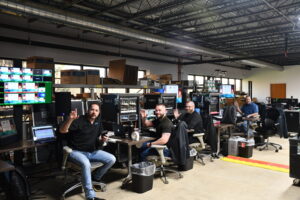
Code Council’s first virtual Committee Action Hearings a virtual success
![]() The International Code Council’s 2021 Committee Action Hearings for the Group A Codes began on Sunday, April 11, and ran through May 5, 2021. This year, the Committee Action Hearings were held virtually for the first time and offered code officials, architects, builders, plumbing officials, contractors, engineers, and fire and energy conservation professionals the opportunity to provide input on the proposed code changes to the Group A International Codes (I-Codes) — the family of model codes used throughout the world that establish minimum requirements for the construction and maintenance of safe, sustainable buildings that protect against disasters like fires, weather-related events and structural collapse.
The International Code Council’s 2021 Committee Action Hearings for the Group A Codes began on Sunday, April 11, and ran through May 5, 2021. This year, the Committee Action Hearings were held virtually for the first time and offered code officials, architects, builders, plumbing officials, contractors, engineers, and fire and energy conservation professionals the opportunity to provide input on the proposed code changes to the Group A International Codes (I-Codes) — the family of model codes used throughout the world that establish minimum requirements for the construction and maintenance of safe, sustainable buildings that protect against disasters like fires, weather-related events and structural collapse.

International Codes considered for Track 1 included the International Building, Property Maintenance and Zoning Codes. Track 2 began on Sunday, April 25, and the International Codes included the International Fire, Fuel Gas, Mechanical, Plumbing, Private Sewage Disposal, Residential, Swimming Pool and Spa, and Wildland-Urban Interface Codes. Only certain sections of the International Residential Code (IRC) were covered in Track 2 — IRC–M: IRC mechanical provisions (Chapters 12–23) and IRC–P: IRC plumbing provisions (Chapters 25–33).
Due to the hearings being a highly synergetic process, Code Council staff, moderators and committee members had the option to gather in a central location for the duration of the process, while adhering to social distancing guidelines. Speaking participants and those interested in listening to the proceedings were able to join virtually. As in previous years, the hearings were available to view for free through a live stream.
More than 1,000 registered individuals participated in Track 1 of the 2021 Committee Action Hearings for the Group A Codes — an overwhelming response for our first virtual code hearing. There were a total 1,870 registrations this year, with 1,202 individuals actively participating in the hearings. That participation is an increase of 28 percent from the 2019 Committee Action Hearings that were held publicly in Albuquerque, N.M. And more than 2,500 code professionals from around the globe tuned in to livestream the hearings.
New technologies now offer a range of potential efficiency-focused benefits for remote participation — such as reducing travel costs and time delays — which can have a number of important advantages over regular face-to-face meetings in a global organization. While it is especially challenging to get people to pay attention in a virtual environment, as participants are not in the same room but are connected only virtually, this was clearly not the case for this year’s hearings, which included new voices in the conversation, allowing for greater participation and providing opportunities for enhanced external transparency and incorporating member and stakeholder voices.
“The virtual code hearings allow us to continue our development of the 2024 I-Codes while also ensuring the health and safety of hearing participants, which is our number one priority,” said Dominic Sims, CBO, chief executive officer of the Code Council. “The hearings are a highly collaborative process that we welcome participation from a diverse group of industry professionals.”







